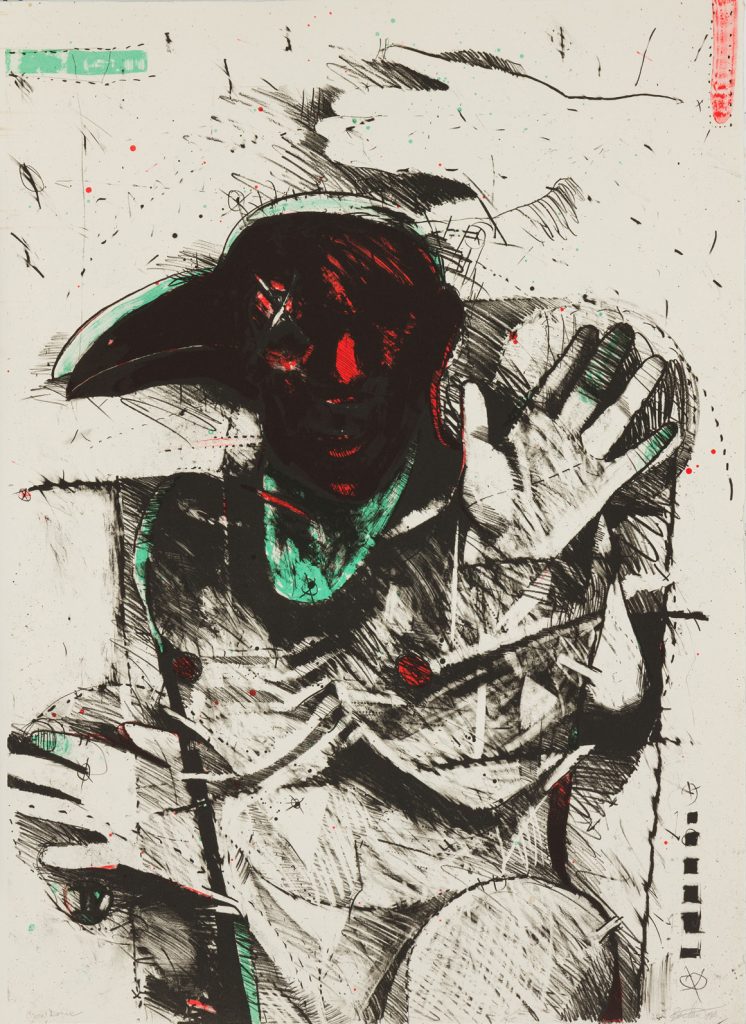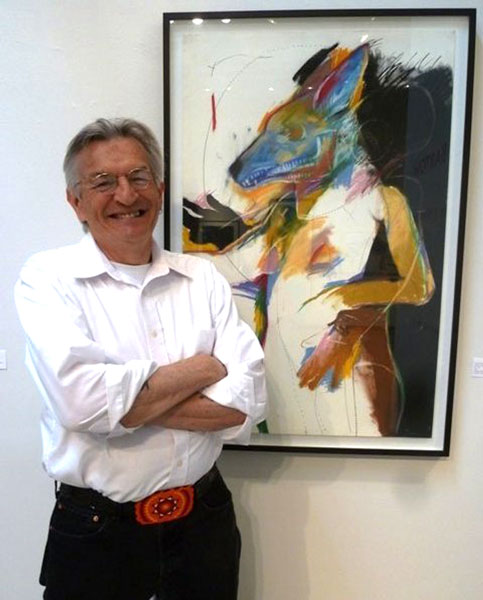
Crow Dance
Rick Bartow
- 1988
- Offset Lithograph
- Image/sheet: 30 x 22"
- 100 Prints in this edition
About the Print
Rick Bartow is inspired by the physicality of drawing, such as the contact of pastel and pencil on paper, erasures that reveal the image, and gestural movements of the hand and arm. Crow Dance, 1988, edition of 100, combines male and crow features that represent the guiding spiritual force of his Yurok ancestors. In Native American mythology and African American folklore, the crow image is a compelling allegorical figure. The transformation of wings into hands represents power in this context. Crow Dance is one of five Bartow prints completed between 1988 and 1989 at Brandywine. He finished two more offset prints in 1997. Bartow creates expressionistic images that speak of transformation, evoke a spiritual presence, and allow for self-reflection.
— Adapted from “Fresh, Human and Personal: Signature of Brandywine Workshop,” Three Decades of American Printmaking: The Brandywine Workshop Collection (Manchester, VT: Hudson Hills Press, 2004)
From the Artist
Drawing courses from inside my head, down my arm, to my hand….
The marks become little dictators. They demand my attention and, sometimes, even my blood as fingers crack and bleed.
Still I believe in the power of drawing as medicine.
In my life I have used this medicine to overcome many obstacles–alcohol, drugs, cigarettes…
I draw because I have no choice: it is my blessing, it is my curse.
—From https://froelickgallery.com/usr/library/documents/main/26/2001_bartow_drawing_as.pdf, accessed 6-2-2021

Rick Bartow
American Native American
Born December 16, 1946 in Newport, OR
Died April 2, 2016 in South Beach, OR
Born December 16, 1946 in Newport, OR
Died April 2, 2016 in South Beach, OR
About the Artist
Rick Bartow was a Native American sculptor, painter, and printmaker born in Newport, OR. He was a member of the Mad River Band of Wiyot Indians, a small tribe indigenous to Humboldt County, CA. Bartow earned a BA in art education from Western Oregon University, Monmouth.
He exhibited internationally at institutions including the Froelick Gallery, Portland, OR; Yale University Art Gallery, New Haven, CT; Chiaroscuro Gallery, Santa Fe, NM; Humboldt State University, Arcata, CA; Northwest Museum of Arts and Culture, Spokane, WA; Derek Simkins Gallery of Tribal Art, Vancouver, British Columbia; Yanagisawa Gallery, Saitama City, Japan; and the Instituto de Artes Gráficas de Oaxaca, Mexico.
—From Brandywine Workshop and Archives records
Curriculum Connections
Suggested Topics for Social Studies and U.S. History
Social Studies and U.s. History
This print reflects the artist‘s desire to challenge stereotypes about Native American people — including the exploitative and caricaturing use of their names and images for sports and other commercial purposes — while the economic, educational, and cultural oppression of Native people continues. The Black Lives Matter movement, which began in 2013 and gained increased urgency in 2020, has focused renewed attention on stereotypes, marginalization, and oppression of people based on race, ethnicity, and religion. The awareness raised by Black Lives Matter has spurred many businesses to reexamine their branding and media strategies.
Questions to Consider?
- What examples can you think of that further explores these ideas in real-time?
- Have you ever met or had a conversation with a Native American?
- The end of the Civil War started a period of aggressive westward expansion of the United States, war waged on Native American tribes by the U.S. army, and seizing or destroying natural resources. What impact did the mass slaughter of buffaloes by whites have on the survival and displacement of Native Americans?
Related Media
- “Now that the Buffalo’s Gone” sung by Buffy Sainte-Marie